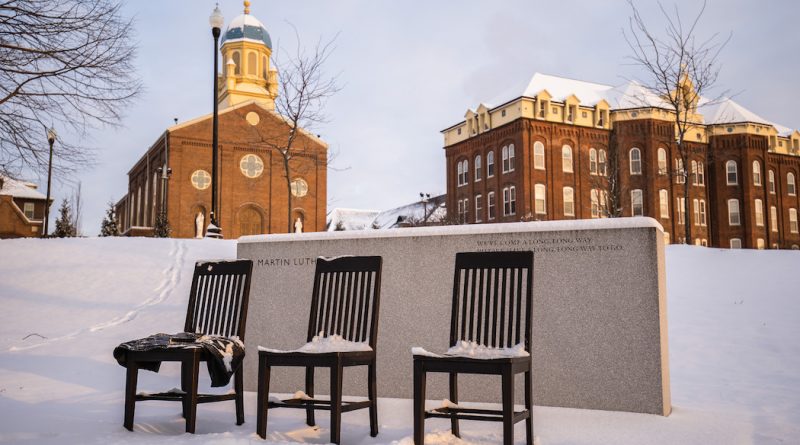Race Relations Expert Delivers Annual MLK Day Address
Carolyn Kroupa
Contributing Writer
This article was originally published on Feb. 7.
On Jan. 22, the annual Martin Luther King Jr. commemorative speaker, Beverly Daniel Tatum, PhD, spoke to a full crowd in Kennedy Union Ballroom as part of the Spring 2019 Speaker Series.
A clinical psychologist, president emerita of Spelman College and best-selling author of “Why Are All the Black Kids Sitting Together in the Cafeteria? and Other Conversations About Race,” Tatum is an authority on topics of race and education and strategies for creating inclusive campus environments.
Promoting diversity and inclusivity on campus is one of UD President Eric Spina’s key initiatives.
Tatum’s presentation, “Closing the Empathy Gap: Community Building through Dialogue,” encompassed the importance of having open dialogue and interracial communication.
She opened her presentation by referring to King’s book, “Where Do We Go from Here: Chaos or Community?” A quote from it, “The line of progress is never straight,” was the overarching theme for her presentation.
She explained how the “empathy gap” is wider today than during King’s lifetime. She attributed this to economic disparity, segregation of neighborhoods and schools, homogenous social networks and the rise in the prison population disproportionally made up of African American males.
In an interview with Flyer News, Tatum said topics like the Black Lives Matter movement and police brutality “have a big impact, particularly on college campuses.”
“It has raised awareness about issues for students who may have not otherwise been thinking about them,” she said. “How you experience that would probably depend on whether you see yourself as part of the community–someone who might have a fatal encounter with the police–or someone who sees themselves as an ally. Your own social position will influence your perspective.”
The power of structured dialogue is what she said is the solution for the white majority to attain empathy for minority groups.
Tatum stated that conversations about race “are not easy conversations to have. Not because they’re not important, but because most people have learned growing up not to talk about these issues.”
Most people’s earliest race-related memory is characterized by uncomfortable emotions. However, people often do not tell anyone about it, she claims. Tatum said this shows people socially “learn they are not supposed to talk about it.”
This feeds into negative concepts such as “color blindness” regarding race, or silence about the topic altogether.
The most effective tool for change is empathy, according to Tatum, and the most successful way to build empathy is to engage in dialogue.
“You can’t solve a problem without talking about it,” Tatum said. “When you’re trying to engage discussion, one of the first things you have to do is let people know that it is okay if they feel a little uncomfortable–it’s very common.”
Tatum offered a strategy to do this called “FFF,” which stands for “felt, found, feel.”
An example of this strategy is, after someone has said something offensive, to say, “I felt that way, but then I found out x, and now I feel y.” This creates a more cordial environment that allows for understanding and learning to take place.
Tatum explained people tell her she is “preaching to the choir” during her presentations. She responds to this idea by saying, “the choir needs rehearsal,” meaning even the people who are directly affected, as well as allies, need to continue to educate themselves in order to educate others.
Additionally, “if the choir is loud enough, it will drown out” ignorant messages, she said.
During Spina’s opening address for Tatum, he stated that the University is “striving to become more diverse and equitable.” He went on to say when progress seems to be moving slowly, he thinks of the King quote, “If you can’t fly then run, if you can’t run then walk, if you can’t walk then crawl, but whatever you do you have to keep moving forward.”
Tatum emphasized, “We are all in this together. We’re all here to learn. We need to be mutually respectful.”
She concluded, “If we don’t want chaos, we must choose community. Change is possible–this is our call to shape the future.”

